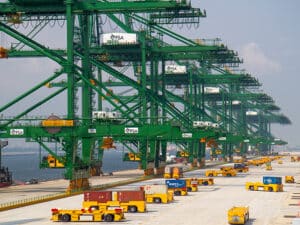
Op-Ed: Digitalization is changing expectations in maritime logistics
Written by
By Martin Wallgren, Group Chief Information Officer, GAC Group
By Martin Wallgren, Group Chief Information Officer, GAC Group
We’ve seen market consolidation, and we’ve seen the “great resignation.” The pandemic has created a market dynamic that presents both challenges and opportunities. Wallgren presents a new strategy for success as fast-moving trends continue to redefine maritime logistics.
After a wave of mergers and acquisitions, service providers still operating post-pandemic are looking to capture contracts previously awarded to smaller firms which are no longer in business. Many of these contracts require niche services. Shipping and logistics markets are seeking information, data and reports to give executives the insights they need to make business critical decisions.
In the past, for example, information on the status of spare parts was held by marine logistics providers responsible for picking, storing and consolidating them for delivery to vessels and offshore platforms. Now, asset owners and operators expect those status reports in their own systems, giving them greater operational control and enabling them to address poor supply chain performance to boost productivity and safety.
With staff numbers down, such insights can no longer be maintained in-house. Businesses are turning to their suppliers for the data they need to guide their decision-making.
EARLY INVESTMENT
The industry must expand its systems and services to meet that demand. For established global businesses, it is a major undertaking.
GAC decided to invest early, and heavily, in an accurate business data model, and that is now paying dividends. We now have what it takes to operate as a ‘data transfer business’ and pivot in response to changing market demands, exactly as what Uber did during the pandemic when it transitioned from taxi to food delivery services.
Data models drive profitability, flexibility and resilience—qualities attractive to would-be recruits as we emerge from the pandemic. At the same time, the importance of global presence and local knowledge should not be overlooked—the principle of ‘boots on the ground’ remains fundamental to engendering trust and confidence. Combined, these attributes help to facilitate the efficient and effective roll-out of digital services. Without them, overcoming the digital skepticism ingrained in the shipping industry is a much greater challenge.
HUMAN ELEMENT
Business success depends on the people involved—all of them. For organizations to get the most from digitalization, progressive management teams must understand technology, be it integration, data governance, cyber security or block chain and AI.
There is also a shift in those starting their careers, most of whom have grown up with the internet. These new recruits are already digitally literate and will prove integral to shaping company culture in the future.
CYBERCRIME
Sadly, the pandemic has provided new opportunities for the unscrupulous. Greater flexibility in working practices brought in as a necessity to keep business working during lockdowns has led to a rise in security threats. Working from home offers many benefits—not least to criminals who see an opportunity to target those isolated from colleagues and feedback from peers ‘in the room’ to check suspicious emails.
It is a trend that demands a rapid response, including refresher cyber security training for all employees. As cybercrime becomes more sophisticated, the human element represents both the weakest link and the best protection. That is why training and equipping staff for the changing world of post-pandemic operations is key.




